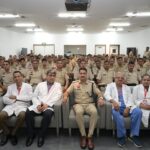The infant was suffering from cyanotic congenital heart disease, resulting in severely low blood oxygen level
Baby Ibrahim is one of the youngest patients to undergo Bi-directional Glenn procedure, a surgical technique to improve pulmonary blood flow and oxygenation in patients with severe structural heart disease.
September 29, 2018, Noida: “This is the rebirth of Ibrahim,” that’s how his family describes the successful treatment of one month old baby Ibrahim from Iraq, who recently underwent a high risk heart surgery at Jaypee Hospital, Noida. Baby Ibrahim was suffering from critical Cyanotic congenital heart disease, which is a group of multiple heart defects that result in low blood oxygen levels. Ibrahim’s underdeveloped heart was unable to pump adequate amount of oxygenated blood which posed high risk to his survival. His case puts him as one of the youngest patients to undergo Bi-directional Glenn procedure, a surgical technique to improve cardiac function in patients with severe structural heart disease.
Born in August 2018, baby Ibrahim was detected with cyanosis since birth, a condition which leads to bluish shade of the skin and mucous membranes. Baby Ibrahim was not feeding properly and started suffering from shortness of breath. Showing very little movement since his birth, he was tiring quickly upon lethargic. While flying down to India, he was provided special oxygen support.
Explaining about the case, Dr. Rajesh Sharma, Director, Paediatric Cardiology Department, Jaypee Hospital, Noida said, “Baby Ibrahim had a complicated background of cardiac problems and post examination he was diagnosed with cyanotic congenital heart disease (CCHD) and Tricuspid Atresia. It is a type of heart disease that is present since birth (congenital heart disease), where the tricuspid heart valve, which allows the blood flow from the right atrium to right ventricle was absent. Thus, the right ventricle was very small with narrow right ventricular outflow track. Due to this defect, there was little or no blood pumped from the right ventricle (right side of the heart) to the body. None of the hospitals back in Iraq agreed to take up the case of baby Ibrahim considering his tender age. Despite all odds, we took up this challenging case after pre-operative stabilization”.
On 1st September, 2018, the patient was taken for high risk surgical intervention Bi-directional Glenn procedure to improve pulmonary blood flow. Blood circulation was re-routed (SVC-PA) to improve the blood flow. This was done to reduce the ventricular workload. The operation was a success, but post the procedure Baby Ibrahim developed Systemic inflammatory response syndrome (SIRS), which is an abnormality affecting the whole body. He also developed evidence of Leucopenia, a reduction in the number of white cells in the blood, which is typical of critical stress. In view of the severity of baby Ibrahim’s condition, he was closely monitored and given critical intervention. The baby improved gradually after 72 hours. He required prolonged and gradual weaning from ventilator and later was taken off on nasal CPAP. His nutrition was carefully planned. With support of medication, the baby was discharged on 25th September, 2018 and is now fit to go back to his country.
Omar (Father of baby Ibrahim) said, “My baby is just one month old but he is a fighter. We took him to almost all best hospitals back in Iraq but considering his tender age, none of them agreed to take his case. Our family was completely despondent, and I feared that I would lose my son. A family friend shared Ibrahim’s report with Dr. Rajesh Sharma of Jaypee Hospital over an email. To our immense relief, Dr. Sharma immediately took my son’s case.
Ibrahim received immediate attention where he was examined and operated under the care of Dr. Sharma. When we were told that the operation is successful, we had no words to express our gratitude to the doctor and his team. Jaypee Hospital has given my son a new lease of life for which we will forever be grateful.”
Such surgeries are complicated, highly demanding and need multidisciplinary team effort. They need clinical expertise and well-equipped operation theaters with advanced equipments. The treatment is usually prolonged and done in multiple stages. Successful execution of complex and risky surgeries demonstrate expert clinical services and advanced healthcare facilities available at Jaypee Hospital. Domestic as well as International patients who would have otherwise gone to the United States of America or Europe for treatment are now choosing Indian Hospitals for affordable treatment, due to faith in doctors and excellent hospital care.







